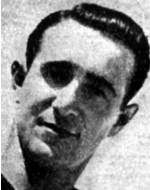Dubno, Yitzhak
Yitzhak, son of Rachel and Moshe Dubno, was born on February 5, 1913 in the city of Wloclawek, Poland, where he spent his youth on the banks of the Weichel River, grew up and became a wealthy man. He was one of the founders of the “Hashomer Hatzair” branch in his city and was an excellent instructor. Many years later his many students from all over the country remembered Yitzhak and spoke about him admiringly. Tosia Altman, the heroine of the struggle against the ghettos in Poland during the Second World War, was his apprentice in those days. He made aliyah on his 20th birthday. He was a founding member of Kibbutz Nahalat Yehuda and later established Negba, where he lived for years, serving on missions and military duties. He was very interested in painting, and many of the pages of his diary are devoted to the evaluation of images and the analysis of their contents. He wrote articles in Ma’arachot, the military journal of the Haganah.
In the War of Independence, Yitzhak was the commander of Negba, and he encouraged the fighters in the difficult days of the siege, demanding vigorous mobilization to dig defensive trenches and shelters. Later on, everyone realized that Yitzhak was right in what he had demanded. On the 12th of Iyar 5708 (21.5.1948), the Egyptians began to bomb the settlement. Yitzhak was busy writing the day’s order, which consisted mainly of speeding up the work in the fortifications. He jumped into the ditch and was killed with his hand outstretched, making his last order to shoot the enemy planes.
Yitzhak was brought to rest in Kibbutz Negba. He left behind a wife and three daughters. One of his daughters was seriously wounded in the shelling of Mishmar Ha’emek. During the underground period Yitzhak was known as “Yoav” and the important military operation in the Negev, “Operation Yoav”, was named after him, as is the Fortress of Yoav. Pages in his memory were printed in the book “The Raging Storm”, in memory of the fallen of Negba, which was published by the kibbutz.
